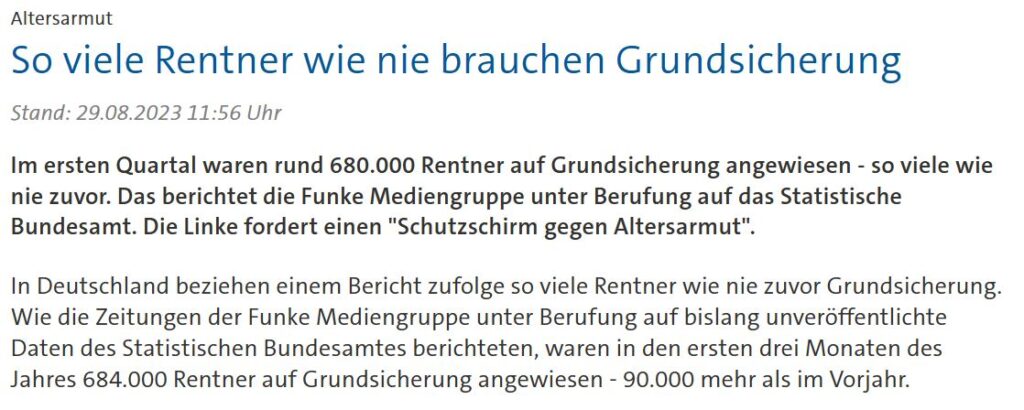On August 29th 2023, the German news channel “Tagesschau” published a report indicating that in Germany more than 680 000 pensioners were dependent on basic income support in the first quarter of 2023. More than ever before. This worrying development was outlined with reference to the German Federal Statistical Office. It comes out to be true.
Basic income support in old age provides financial support since 2003 for people in need who are unable to finance their own living expenses due to their age and, for example, an insufficient pension. This service was introduced on January 1st 2003 and is granted as a social assistance benefit. In order to receive these benefits, those affected must submit an application to the responsible local authority, usually the local social welfare office. However, many external influences have increased the demand for basic income support.

Increase in demand
The Tagesschau has reported a notable rise in the demand for basic security benefits. In 2003, a total of 257 734 pensioners applied for basic income support in Germany. Fast forward to the end of 2022 and this figure had surged to 658 540, reaching 684 360 pensioners in the first quarter of 2023 which is the highest number since its introduction, as the data of the Federal Statistical Office shows.
Different reasons
This escalating trend is influenced by a myriad of factors. According to insights from the social welfare office of the district of Aurich, contemporary global dynamics are significant contributors. Notably, the ongoing conflict in Ukraine has given rise to persistent inflation and escalating energy costs, impacting the financial stability of numerous individuals, and consequently intensifying the demand for social support services. Additionally, the imperative to extend basic social security to refugees from Ukraine further compounds the strain on the existing system.
Yet another influential factor stems from historical gender roles. Traditionally, women have predominantly taken on household responsibilities, translating to lower pension entitlements compared to men.
Demographic shifts also play a pivotal role in the unfolding scenario. The increasing life expectancy means a growing number of individuals are reaching pensionable age, posing a dual challenge by not only testing the resilience of the pension system but also contributing to a burgeoning population dependent on basic benefits.
Conclusion
In short, in Germany more than 680 000 pensioners were dependent on basic income support in the first quarter of 2023, due to several causes such as global dynamics, the impact of the Ukraine conflict, historical gender-based pension disparities and demographic shifts. Therefore, more pensioners are dependent on it than ever before.
RESEARCH | ARTICLE – Alva Frankenstein and Laura Christoffers, Jade University of Applied Sciences, Germany
Leave your comments, thoughts and suggestions in the box below. Take note: your response is moderated.





